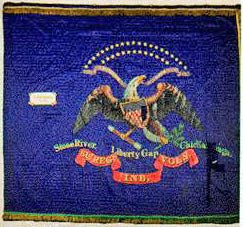The war took his health and his life just as surely as it did for the President. He ran the state like a dictator. Staunchly Republican. he supported President Lincoln and the northern war effort at all costs. When the Indiana State Legislature, composed primarily of Democrats, refused to provide funding in support of troops and arms for the northern armies, Governor Morton sent the Legislature home and refused to call it back into session throughout the war. He was still able to provide more than his share of support in both men and arms by seeking private donations from rich Hoosiers and more than meeting his enlistment quotas by mustering volunteer soldiers. He was constantly meddling in affairs involving Indiana soldiers, particularly when their political leanings were different from his own, but his support new no bounds, and Lincoln and the northern generals just looked the other way, while Governor Morton did what he felt he needed to do. He was a definite thorn in the side of Rebels, and of Democrats, whom he basically looked upon as no better than traitors.
Governor Morton and Davis' Killing of Nelson.
Maj-Gen William F. Nelson, Commander, III Corps, was shot and killed by Brig-Gen Jefferson C. Davis, who was later to command the 1st Division, XIV Corps, of which the men of the 81st Indiana along with many other Indiana regiments would be members. Davis, who was also from Indiana, had been a Lieutenant in the Regular Army at Fort Sumter during the bombardment. Supposedly he had been insulted and slapped by Nelson previous to the altercation. At the time of the incident Davis was in the company of Governor Morton, who had also had a run-in with Nelson due to Nelson's poor handling of green Indiana soldiers at the Battle of Richmond in Kentucky. Davis shot Nelson at the Galt House in Louisville. Maj-Gen Charles C. Gilbert was assigned to permanent command of III Corps to replace Nelson. Buell was relieved as Commander, Army of the Ohio. General George H. Thomas was offered the command in a letter from the government. Thomas turned the offer down and became Deputy Commander. Buell remained in command. He complained of Gov Morton interfering with the discipline of Indiana troops including the matter of Gen Davis. Davis was never court-martialed for killing Nelson and later became a very competent commander.
Governor Morton and Morgan's Great Indiana-Ohio Raid.
When Morgan's Raiders, including the 6th Kentucky Cavalry, Confederate, were approaching the Indiana-Ohio border, Governor Morton of Indiana had refused to subordinate the Indiana militia to General Ambrose Burnside and the regular army commanders who were coordinating the pursuit of Morgan's Raiders using primarily Kentucky troopers. Gov Morton was also constantly interfering with Burnside and his commanders, and refused to coordinate Indiana Militia with General Burnside. Burnside coordinated the pursuit from Cincinnati, Ohio, constantly sending and receiving telegraph messages to and from the commanders and local administrators. This was probably one of Burnsides finest moments, and one for which he gets little credit. Governor David Tod of Ohio was much more cooperative than Governor Morton had been. Governor Tod agreed to have martial law declared and offered the Ohio Militia to General Burnside to use in any way he saw fit to thwart Morgan. When Morton offered Indiana Militia to Tod, Tod referred him to Burnside. Tod was a Democrat. Morton was a Republican.
These are just a few examples regarding Governor Morton's relationship with Hoosier soldiers. There are other examples documented in my CW web Page:
http://notdemonro.fatcow.com/index.htm

No comments:
Post a Comment